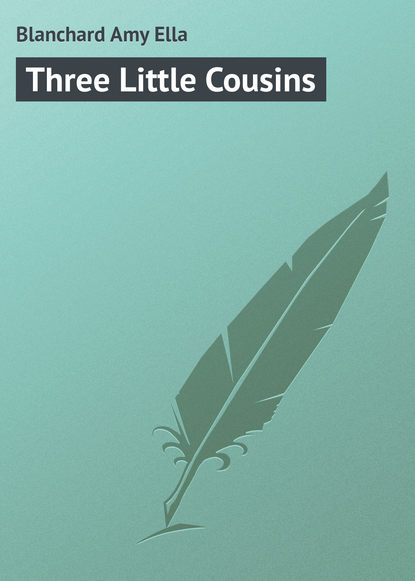По всем вопросам обращайтесь на: info@litportal.ru
(©) 2003-2024.
✖
Three Little Cousins
Настройки чтения
Размер шрифта
Высота строк
Поля
Miss Ainslee put her arm around her and whispered back: "No, dear, I didn't, for it wouldn't have been true. Sometimes you do get more than half of them right."
"I do try," said Molly wistfully.
"I know you do," returned Miss Ainslee, giving her a hug. So Molly went home satisfied that after all her uncle's visit to the school meant only good will and not a desire to discover the weak spots in his niece's record.
Uncle Dick made a second visit to the school at another recess hour when it threatened rain and he brought umbrellas for Molly and Polly, and rain it did, coming down in such torrents for a while that he accepted the shelter offered, and, while the thunder rolled and the lightning flashed, told the children such thrilling stories as completely absorbed the attention of the whole school, and no one thought of being afraid of the storm.
Then came the last day of the term when Uncle Dick, as invited guest, came with Mrs. Shelton to see the pretty Garden of Verses which Miss Ainslee had arranged for the closing entertainment. Even Polly took part in that and repeated the lines:
"A birdie with a yellow bill
Hopped upon the window sill,
Cocked his shining eye and said.
'Ain't you 'shamed, you sleepy-head!'"
while Molly, wearing a long silken gown, swept in with rustling skirt to say:
"Whenever auntie moves around
Her dresses make a curious sound;
They trail behind her up the floor,
And trundle after through the door."
She was called to the front of the little stage to receive the bunch of lovely roses her Uncle Dick sent her, and felt very grand when they were handed up to her. Polly, too, came in for her share of flowers, though hers were sweet-peas because her name began with P. However, that did not account fur the white bell-like blossoms which were presented to Miss Ainslee, though Polly explained it by saying, "She is a belle, you know," and did not see the whole joke till she remembered Miss Ainslee's first name.
To Polly, Miss Ainslee was a paragon of perfection. She had never before known so dainty and pretty a young lady. The tutor which she and her brothers had was a young man who had gone to Colorado for his health, and when stranded in Denver was chanced upon by Dick Reid who befriended him and brought him home, where he was glad enough to teach the niece and nephews of his former college mate. Miss Ainslee was a teacher of quite another stamp and ardent little Polly adored her.
When the little girls had returned from the closing exercises of the school, their thoughts turned to the next excitement which was the journey northward with Uncle Dick. They were to start the very next morning, and their trunks stood ready to go.
As they entered the hall, Mrs. Shelton picked up a letter which the postman had just brought. It had a foreign postmark, and Molly knew it must be from her Aunt Evelyn, her Uncle Arthur's wife, who lived in England. Mrs. Shelton sat down in the library and opened the letter. She had read only a few lines when she exclaimed: "Well, I declare!"
"What is it, mother?" asked Molly. "What does Aunt Evelyn say? How is Mary?"
"She is better, and what do you think, Molly? Uncle Arthur is coming over and is going to bring Mary with him. They are on their way."
"Oh, Polly! Polly!" cried Molly, "what do you think? Our Cousin Mary is coming. Three Marys in one house and all named after the same grandmother. Tell us more, mother. When are they coming and how long are they going to stay, and all about it. Are they going to Aunt Ada's with us?"
"Wait a minute," said Mrs. Shelton, scanning the final page of her letter. Molly watched her till she read the last word. "It is this way," Mrs. Shelton told her; "your Uncle Arthur has to come to America on business and Mary, you know, has not been very well, so when the doctor advised a sea voyage, Uncle Arthur decided to bring Mary with him and leave her with some of us while he should travel about to look after his business matters. It was all determined upon very hurriedly and Aunt Evelyn is much concerned lest she is giving us a charge we may not wish to undertake. However, I shall hasten to let her know that we shall be delighted to welcome Mary. My own little niece whom I have never seen! It is a great happiness to have both my nieces here this summer." She smiled at Polly.
"But when is she coming?" asked Molly.
"In about a week I should judge."
"Oh, we will be gone then," said Molly, turning to Polly. She hardly knew whether to be glad or sorry of the fact.
"I am glad I determined to wait a little later before going away with your father," continued Mrs. Shelton, "for now I shall be here to receive Arthur and Mary, and can bring Mary up with me on the way to Rangeley. Aunt Ada will be perfectly delighted to know she is to have a visit from Mary, for she has asked so many times that her parents would lend her for a summer."
"It will be just lovely to expect her," said Molly hospitably. "I do hope we shall like her, mother, and that she will be as easy to get acquainted with as Polly is. I feel as if I had always known Polly; she is just like a sister."
"I fancy you will find Mary somewhat different from Polly," said Mrs. Shelton, remembering her sister-in-law's exact little ways, and thinking of Polly's unfettered life on the ranch. "However, I am sure she is a dear child and that we shall love her very dearly."
"I wish she had been here to see the Garden of Verses and our costumes," said Polly, who was quite carried away by the morning's performance.
"Oh, I suppose she sees much finer things in England," said Molly. "I suppose she dresses much finer, too, than we do. Why, there are kings and queens and princesses over there, and they wear ermine and crowns and tiaras."
"I haven't the least idea what a tiara is," said Polly.
"I don't know exactly myself," acknowledged Molly, "but I know it is something you wear on your head and it is studded with diamonds or some kind of precious stones."
"Maybe it is some kind of hat," ventured Polly.
Molly wasn't quite sure, but she wondered if Mary would have one. "At least she can tell us what it is like," she remarked to Polly.
Mrs. Shelton had hurried from the room to tell the news to her brother and the little girls were left in the library alone. Molly was thinking very seriously. Presently she said: "Polly Perrine, if you will never, never tell any one, I'll tell you something. Cross your heart you won't tell."
Polly promptly crossed her heart. "I won't tell," she assured her cousin.
"Then," said Molly looking furtively around, "I am not sure I am glad Mary is coming."
"Oh, why not?" asked Polly, looking the least bit shocked.
"Why, she may be prim and fusty and spoil our plays. I notice often that two girls can play together beautifully, but when a third one comes she is sure to want to do something that one of the others doesn't like and either breaks up the play or gets mad and goes off making you feel sort of hurt and queer inside. You know it is hard to please everybody and the more people you have to please the harder it is."
Polly pondered upon this philosophy of her cousin's. "Well," she said finally, "perhaps if she doesn't like to play our way, she can find some one else to play with."
"Of course she can. I never thought of that," said Molly in a relieved tone. "I remember now before I knew you were coming mother told me that Mrs. Wharton was going to have her granddaughter with her this summer, and I was very glad because the Mowbrays have gone abroad, and I expected to have them to play with. Now we can pair off; you and I can go together and Mary can go with Grace Wharton. I don't suppose," she added after a minute, "that it would be quite polite always to have it that way, for Mary is our own cousin and we can't shove her off on a stranger."
"Maybe we shall not want to," said Polly. "If she is real nice, Molly, we won't mind taking turns, or we can all three play together when the Wharton girl isn't there."
"But don't you ever, ever tell that I said I wasn't sure of wanting Mary," said Molly impressively.
Polly promised, and just then they were called to luncheon and went down-stairs with their arms around each other.
CHAPTER III
Mary
A week later the family was settled for the summer in Miss Ada Reid's cottage by the sea. In front of them was a stretch of green; beyond were the jagged rocks, and then came the ocean. The landing was some distance from the cottage and was upon the bay side of the peninsula, so, although Polly had caught glimpses of the sea during her journey, she did not have a clear view of the wide expanse until they had nearly reached the house and the great blue ocean spread out before her. Then she danced up and down with sheer joy.
"It is just as big and just as blue as I thought," she cried. "Oh, I am so happy! I am so happy!"
Molly was delighted at Polly's enthusiasm, for she, too, loved the sea and the rocks and the wide stretches of grassy hummocks. "There is the cottage," she told her cousin; "the one peeping over that little hill. It looks just like a brownie, doesn't it, with its surprised window-eyes? I always call the cottage 'The Brownie,' and Aunt Ada says it is a very good name for it, because it is a sort of brown."
"I should call it gray," said Polly.
"It is really gray, but it is a sort of brownish gray, and anyhow I like the name of Brownie for it. There is Aunt Ada on the porch watching for us."
Miss Reid came running out to meet them. She gave Molly a hug and a kiss and then turned to her other niece. "And this is our Polly, isn't it?" she said. "Bless the dear; I am so glad to see her. Come along in all of you; I know you are as hungry as hunters and I have dinner all waiting."
"Oh, Aunt Ada, is there to be baked mackerel?" asked Molly.











